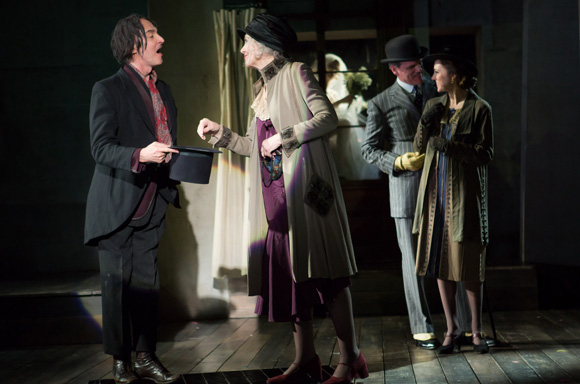The Threepenny Opera
Martha Clarke stages a middling revival of the classic Kurt Weill-Bertolt Brecht collaboration.

(© Kevin Thomas Garcia)
A notorious thief looks at his wife and says, "I'm thinking of going into banking, exclusively. It's safe and the takes are bigger." Like all of Bertolt Brecht's plays, The Threepenny Opera has a strong point of view when it comes to economics and society. It requires a director with an even stronger vision to carry Brecht's perspective into the 21st century. Unfortunately, director/choreographer Martha Clarke doesn't have one, or at least one that is readily visible in her revival at Atlantic Theater Company. While Kurt Weill's timeless music is still there, the blood is mostly drained from Brecht's words. The result is a boring two hours in the theater.
Translated to English by Marc Blitzstein (The Cradle Will Rock), The Threepenny Opera is Brecht's tale of the thin line between upstanding business and organized crime. Jonathan Jeremiah Peachum (F. Murray Abraham) and Macheath (Michael Park) are what you might call "job creators." Macheath is the most notorious criminal in Victorian London, heading a gang of thieves and muggers. Peachum runs a network of Dickensian beggars, taking in upwards of 50 percent of their earnings in exchange for a license to panhandle. But when Macheath elopes with Peachum's daughter, Polly (Laura Osnes), he initiates a turf war with his fellow entrepreneur.
In the opening moments of the show, Peachum scurries across the stage and tells us that this Threepenny Opera had to be so cheap, "even a beggar could afford it." Rather than an artfully imagined "poor theatre," à la Jerzy Grotowski, Clarke's definition of "cheap" bears more than a passing resemblance to community theater.
Donna Zakowska's costumes are stock theatrical Victorian-Edwardian (not authentic or consistent in period, but smacking of a time over 100 years ago across the pond). They could easily be stored away and brought back out for future productions of Oliver! or My Fair Lady. Christopher Akerlind's dim lighting casts dramatic shadows against the muslin curtains and gray walls of Robert Israel's set. This feels similarly predictable, like a cartoonish parody of a Brecht play. Even Clarke's jumbled choreography looks haphazard and half-considered. It's more sloppy than rigorous in its poverty.
There's really nothing racy or controversial about this production except for a fleeting instance of full frontal nudity. This "shocking" moment is followed by a steamy brothel scene featuring shirtless men in suspenders grinding against women in ragged negligees. Rather than raise the stakes of the story or provide us with insight into the sexual exploitation inherent in capitalism, these moments just feel gratuitous; they also have the adverse effect of reminding us of the more amusing pursuits we've forgone to spend a night in the theater.
The otherwise dull brothel scene does garner the evening's one memorable performance: As the prostitute Jenny (Macheath's former squeeze), Sally Murphy delivers the most thrilling rendition of "Pirate Jenny" I have ever seen. Wearing a see-through nightie and sweating as though she's coming down from a three-day bender, Murphy stares directly at the audience as she sings Brecht and Weill's revenge-fantasy song about an abused woman who is secretly a pirate queen about to lay waste to the whole town. Her desperation is raw and compelling, making her betrayal of Macheath perfectly understandable. After all, didn't he betray Jenny first? The whole world betrayed Jenny first.
It's too bad that the rest of the show isn't that ballsy in its specificity. No matter what you think of Brecht's smart-ass brand of Marxism, it is essential to the play. It also very much has a place in modern-day discussions of economics and society. Clarke's vague production makes these real-life issues feel distant and alien, a fairy tale of a Victorian England that never really existed in the first place.









